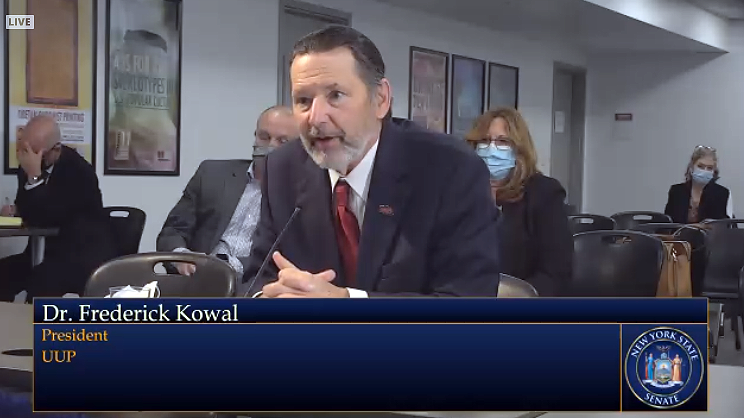
With the coronavirus pandemic receding, and lawmakers gearing up for the 2022 state budget, UUP President Fred Kowal told state senators and SUNY trustees in two days of hearings that they cannot rest on the temporary boost of the pandemic aid for SUNY.
“We believe it’s important to get state aid to SUNY, and at a level it hasn’t seen in at least a decade,” Kowal said in his opening remarks at an Oct. 27 hearing by the state Senate Committee on Higher Education, chaired by Sen. Toby Ann Stavisky.
The hearing unfolded at Stony Brook University with the goal of soliciting input from a range of public higher education advocates about the most essential needs in New York. Kowal used his time to note that UUP is optimistic about the upcoming budget, with Gov. Kathy Hochul striking all the right notes so far about building up New York’s resources, including SUNY, and a SUNY chancellor, Jim Malatras, who has worked well with UUP.
Read UUP’s press release HERE.
HOSPITALS DESPERATE FOR HELP
But optimism does not automatically translate to certainty and dollars. Carolyn Kube, statewide vice president for professionals and immediate past president of the UUP Stony Brook HSC Chapter, accompanied Kowal to the hearing. Kowal referenced all that Kube and the other academic medical center chapter presidents endured during the pandemic as he reminded the senators that helping SUNY means helping SUNY’s four-year campuses and its public teaching hospitals.
“Let’s be clear: COVID did not create the crisis of care at the SUNY hospitals,” Kowal said. “The lack of state funding created the crisis.”
Unlike other branches of SUNY, the hospitals receive no state operating funds, and have not for the past three years. Yet they bore some of the greatest responsibilities for patient care during the pandemic, and now face terrible staff shortages in many critical areas, including respiratory therapy. The hospitals are the only part of SUNY that also must pay their own debt service out of their revenues, without any help from the state.
“From COVID to debt service, to Medicaid cuts and changes to the DSH program, our SUNY hospitals have been under assault, while the need for their services and care only grows,” Kowal testified. “UUP is urgently requesting the proper state support for our SUNY hospitals.”
PLEDGING TO WORK WITH SUNY
For Kowal, it was the second consecutive day of testimony before state leaders in higher education who could help shape the next SUNY budget.
He also testified before members of the SUNY Board of Trustees on Oct. 26, asking for their support in seeking an increase of funding for SUNY. In that testimony, Kowal also invoked the strong relationship that UUP enjoys with SUNY leaders, and especially with Malatras, and he pledged UUP’s support in seeking an increase in operating funds for the university.
The SUNY four-year campuses did fare better in the current state budget than UUP original feared, but that was largely due to an unexpected flood of federal pandemic aid to higher education in New York last spring. Perceptions of the state’s role in averting financial disaster in the current budget differ, as was evidenced in an exchange between two members of the Senate committee at the Stony Brook hearing.
MORE, BUT NOT ENOUGH
The Oct. 27 hearing opened with Sen. John Liu of Queens directly contradicting Stavisky’s opening remarks, in which she commented that, “This was a really good year for higher education.” She went on to list several accomplishments in last year’s final enacted budget—gains which UUP has also acknowledged—including a plan to close the TAP Gap and $1 million in new funding for mental health services for students.
Liu countered that the current budget’s funding “may be more than in recent years, but ‘more than’ is not enough.’”
Stavisky announced that lawmakers plan another hearing on funding needs for public higher education in New York for Nov. 22, at the Legislative Office Building. Watch the UUP website and the Connect newsletter for details on that hearing.
